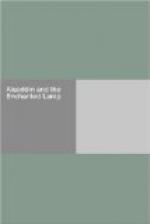[FN#31] Milah, plural of melih, a fair one.
[FN#32] Khemseh senin. Burton, “fifteen.”
[FN#33] Shabb, adult, man between sixteen and thirty.
[FN#34] Femu ghefir min el aalem. Burton, “All the defenders of the realm.”
[FN#35] Night CCCCXCVIII.
[FN#36] Syn. “depose.”
[FN#37] Lit. “that which proceeded from him.”
[FN#38] See ante, p. 3, note.{see FN#23}
[FN#39] Night CCCCXCIX.
[FN#40] i.e. imposed on me the toil, caused me undertake the weariness, of coming to Cairo for nothing.
[FN#41] Forgetting his mother.
[FN#42] i.e. no mortal.
[FN#43] Keszr abouka ’l fulani (vulg. for abika’l fulan). Burton, “Such a palace of thy sire.”
[FN#44] i.e. it is not like the journey to Cairo and back.
[FN#45] i.e. in God grant thou mayst.
[FN#46] Or “jade” (yeshm).
[FN#47] Night D.
[FN#48] “Edh dheheb el atic. Burton, “antique golden pieces”; but there is nothing to show that the gold was coined.
[FN#49] The “also” in this clause seems to refer to the old man of the dream.
[FN#50] Keszr, lit. palace, but commonly meaning, in modem Arabic, an upper story or detached corps de logis (pavilion in the French sense, an evident misnomer in the present case).
[FN#51] Lit. “put the key in the lock and opened it and behold, the door of a palace (hall) opened.”
[FN#52] Takeli, sing. form of tac, a window. Burton, “recess for lamps.”
[FN#53] Lit. “till he join thee with.”
[FN#54] Or “Cairo,” the name Misr being common to the country and its capital.
[FN#55] Badki tecouli[na]. Badki (lit. after thee) is here used in the modern sense of “still” or “yet.” The interrogative prefix A appears to have dropped out, as is not uncommon in manuscripts of this kind. Burton, “After thou assuredst me, saying, &c.”
[FN#56] Here she adopts her son’s previous idea that the old man of the dream was the Prophet in person.
[FN#57] Night DI.
[FN#58] Cudoum. The common form of welcome to a guest.
[FN#59] Or “upper room” (keszr).
[FN#60] Eight; see ante, p. 14. {see FN#46}
[FN#61] Edh dheheb el kedim.
[FN#62] Edh dhelieb er yemli, lit. sand. (i.e. alluvial) gold, gold in its native state, needing no smelting to extract it. This, by the way, is the first mention of the thrones or pedestals of the images.
[FN#63] Lit. “[With] love and honour” (hubban wa kerametan). a familar phrase implying complete assent to any request. It is by some lexicologists supposed to have arisen from the circumstance of a man answering another, who begged of him a wine-jar (hubb), with the words, “Ay, I will give thee a jar and a cover (kerameh) also,” and to have thus become a tropical expression of ready compliance with a petition, as who should say, “I will give thee what thou askest and more.”




